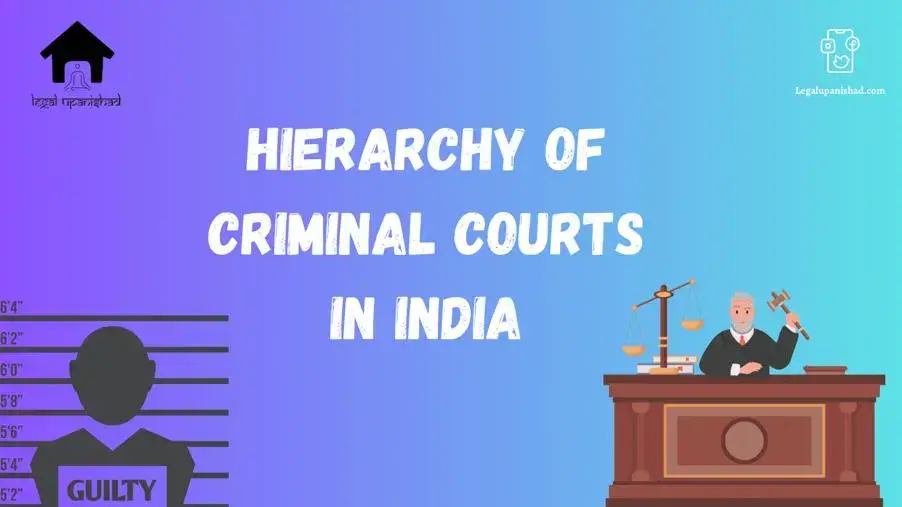This article on ‘HIERARCHY OF CRIMINAL COURTS IN INDIA’ was written by Shashanki Yadav, an intern at Legal Upanishad.
INTRODUCTION
The Indian judicial system comprises a multi-tiered hierarchy of criminal courts, each with distinct powers and jurisdictions. This hierarchical structure plays a crucial role in the administration of justice and the adjudication of criminal cases in India. This article delves into the intricacies of the hierarchy of criminal courts in India, focusing on their powers, jurisdictions, and functions.
THE SUPREME COURT OF INDIA
The Supreme Court of India, located in New Delhi, is the highest court in the country. It serves as the apex judicial authority and is vested with the ultimate appellate jurisdiction over both civil and criminal matters. Under Article 136 of the Indian Constitution, the Supreme Court has the power to grant special leave to appeal, making it the final court of appeal.
The primary functions of the Supreme Court in criminal matters include:
- Adjudication of Constitutional Issues: The Supreme Court interprets the constitutionality of laws and government actions, ensuring that they do not violate fundamental rights.
- Review of Death Penalty Cases: The Supreme Court reviews and confirms death penalty sentences, ensuring that they meet the highest standards of justice.
- Supervisory Jurisdiction: It has the power of superintendence over all other courts and tribunals in India, ensuring the uniform application of law.


HIGH COURTS
India has 25 High Courts, each serving one or more states or union territories. High Courts have both original and appellate jurisdiction in criminal matters. Their jurisdiction extends to cases involving serious offenses, including murder, rape, and large-scale financial fraud.
Key powers and functions of High Courts in criminal cases:
- Appellate Jurisdiction: High Courts hear appeals against judgments of subordinate courts within their territorial jurisdiction.
- Writ Jurisdiction: They can issue writs, including habeas corpus and mandamus, to protect fundamental rights and ensure justice.
- Supervisory Jurisdiction: High Courts exercise supervisory control over the lower judiciary and can take suo moto cognizance of matters affecting the administration of justice.
SESSION COURTS
Sessions Courts are lower in the hierarchy and are established in every district or group of districts. These courts primarily deal with serious criminal cases that carry sentences of over seven years, including cases of murder, rape, and dacoity.
Key features of Sessions Courts:
- Original Jurisdiction: They have original jurisdiction over the offenses committed within their territorial jurisdiction.
- Sessions Trials: Serious criminal cases are tried by the Sessions Judge. They can award sentences up to life imprisonment.
- Appeals: Appeals from Magistrate’s Courts are heard by Sessions Courts.
MAGISTRATE’S COURTS
Magistrate’s Courts are at the base of the criminal court hierarchy. They are established in every district and are responsible for the trial of less serious criminal cases. These courts play a crucial role in the initial stages of criminal proceedings.
Powers and functions of Magistrate’s Courts include:
- Cognizance: They take cognizance of offenses, conduct preliminary inquiries, and issue arrest warrants.
- Trial of Summary Offenses: They try cases involving minor offenses with a maximum sentence of up to two years.
- Juvenile Justice: Magistrate’s Courts handle cases involving juvenile offenders under the Juvenile Justice Act.
SPECIALIZED COURTS
In addition to the standard hierarchy, India also has specialized courts to address specific types of crimes. Some notable examples include:
- Special CBI Courts: These courts exclusively handle cases investigated by the Central Bureau of Investigation (CBI) and other specialized agencies.
- Narcotics and Psychotropic Substances Courts: These courts deal with offenses related to narcotics and psychotropic substances.
- Terrorism Courts: Established to expedite trials related to acts of terrorism and insurgency.
CONCURRENT JURISDICTION AND TRANSFER OF CASES
It’s important to note that the criminal court hierarchy in India often involves concurrent jurisdiction. This means that multiple courts may have jurisdiction over the same case. In such cases, provisions like Section 406 of the Criminal Procedure Code (CrPC) allow for the transfer of cases from one court to another to ensure a fair trial.
CONCLUSION
The hierarchy of criminal courts in India is a complex and vital system for the administration of justice. Each level of the hierarchy serves a specific purpose and has well-defined powers and jurisdictions. This system ensures that criminal cases are adjudicated efficiently and fairly, upholding the principles of justice and the rule of law in the country. Understanding the structure and functions of these courts is essential for anyone navigating the Indian legal system.
LIST OF REFERENCES
- ‘Classes of Criminal Court in India under CrPC’, Study IQ, 25 July 2022, available at: https://www.studyiq.com/articles/classes-criminal-court-india-crpc-criminal-procedure-code1973-judiciary-free-pdf/#:~:text=Supreme%20Court.,Metropolitan%20Magistrates%20in%20metropolitan%20areas)
- Arryan Mohanty, ‘Criminal Courts in India: Types & Hierarchy’, Law Insider, 1 April 2022, available at: https://www.lawinsider.in/columns/criminal-courts-in-india-types-hierarchy
- Mimi Dharshana, ‘Hierarchy of Courts in India’, Lawctopus, 26 April 2023, available at: https://lawctopus.com/clatalogue/clat-ug/hierarchy-of-courts-in-india/

